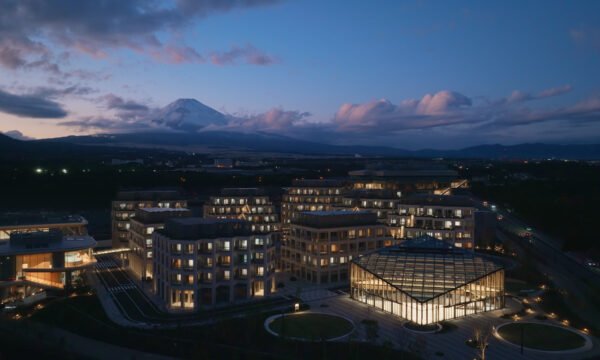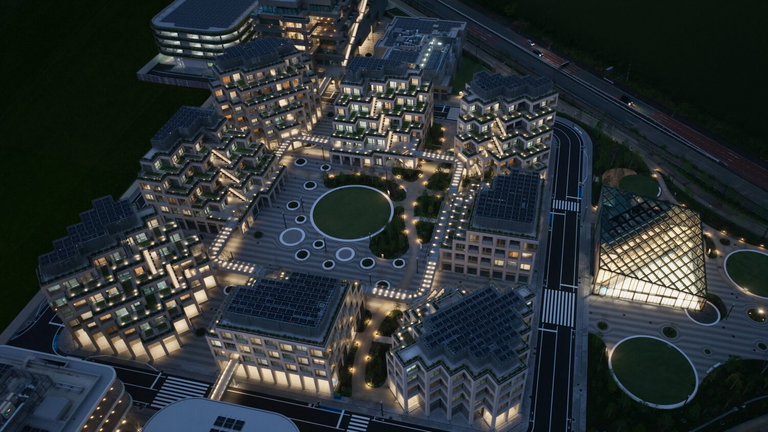KEY FACT: Toyota's groundbreaking "Woven City," a 175-acre smart city located at the base of Mount Fuji in Japan, has completed its first phase of construction and is set to welcome its first residents in late 2025. Designed as a "living laboratory," the city will test cutting-edge technologies, including autonomous vehicles, robotics, AI, and hydrogen fuel cell-powered energy systems, within a real-world environment. Featuring a unique infrastructure with dedicated streets for automated driving, pedestrians, and personal mobility vehicles, the city integrates sustainable wooden architecture and advanced smart home technologies. Initially housing 360 residents, including Toyota employees and their families, Woven City aims to expand to 2,000 residents in subsequent phases, serving as a collaborative hub for innovation in mobility, sustainability, and urban living.

A computer mockup of Woven City. Source: Toyota
Toyota Completes AI and Robotics-powered ‘Woven City’
Japanese automotive giant Toyota has concluded plans to open its ambitious "Woven City," a 175-acre high-tech metropolis situated at the base of Mount Fuji in Japan. The company made the development known to the public after it reached a significant milestone with the completion of its first phase of construction. Announced at CES 2025 in Las Vegas, the company revealed plans to officially launch the city in the fall of 2025, with the initial group of residents, primarily Toyota employees and their families, set to move in during that period.
At CES 2025, Toyota Motor Corporation (“Toyota”) announced the completion of Phase 1 construction of Toyota Woven City (“Woven City”), its test course for mobility. The launch of Phase 1 is planned for fall 2025 or shortly thereafter. Source
The Envisioned "Woven City" is designed to serve as a testbed for a variety of cutting-edge technologies, including autonomous vehicles, robotics, smart homes, and artificial intelligence. The city will feature a unique infrastructure with three types of streets interwoven on the ground level: one dedicated to automated driving, another for pedestrians, and a third for pedestrians with personal mobility vehicles. Additionally, there will be an underground roadway used for the transport of goods.
The Woven city's architecture emphasizes sustainability and innovation. Buildings are constructed primarily from wood, utilizing traditional Japanese craftsmanship alongside robotic production methods. Residences are equipped with the latest smart home technologies, including in-home robotics to assist with daily living and AI systems to monitor occupants' health. The city is also powered by hydrogen fuel cells, reflecting Toyota's commitment to sustainable energy solutions.
Toyota's chairman, Akio Toyoda, highlighted the significance of Woven City during his presentation at CES 2025, stating Toyota's resolve to accelerate the pace at which new technologies can be tested and developed at Woven City.
The project is part of Toyota's strategy to transition from an automobile manufacturer to a mobility company, exploring new technologies and business models that extend beyond traditional vehicle production. According to Toyoda, Toyota aims to accelerate innovation in mobility and related fields by creating an environment where new technologies can be developed and tested in real-world conditions. In his words:
"Woven City is more than just a place to live, work, and play. It's a living laboratory where the residents are willing participants, giving inventors the opportunity to freely test their ideas in a secure, real-life setting."

Source: Toyota
In addition to serving as a testing ground for new technologies, Woven City is expected to foster collaborations with various partners. Toyota has invited experts from different fields to participate in the project, including firms working on pollen-free environments for allergy sufferers and companies developing futuristic vending machine concepts. The city will also explore new food cultures through collaborations with instant noodle manufacturers and coffee companies aiming to create unique café experiences.
While the initial phase will accommodate approximately 360 residents, Toyota plans to expand the population to around 2,000 individuals in subsequent phases. The company has indicated that public access to Woven City will be limited initially, with plans to open the city to visitors and participants from 2026 onwards.
The completion of Phase 1 and the upcoming launch of Woven City marks a significant step forward in Toyota's vision for the future of mobility and urban living. Toyota is ready to create a blueprint for smart cities of the future, addressing societal challenges and enhancing the quality of life for residents by integrating advanced technologies into everyday life within a real-world environment.

If you found the article interesting or helpful, please hit the upvote button, and share for visibility to other hive friends to see. More importantly, drop a comment below. Thank you!
This post was created via INLEO, What is INLEO?
INLEO's mission is to build a sustainable creator economy that is centered around digital ownership, tokenization, and communities. It's Built on Hive, with linkages to BSC, ETH, and Polygon blockchains. The flagship application: Inleo.io allows users and creators to engage & share micro and long-form content on the Hive blockchain while earning cryptocurrency rewards.
Let's Connect
Hive: inleo.io/profile/uyobong/blog
Twitter: https://twitter.com/Uyobong3
Discord: uyobong#5966
Posted Using InLeo Alpha